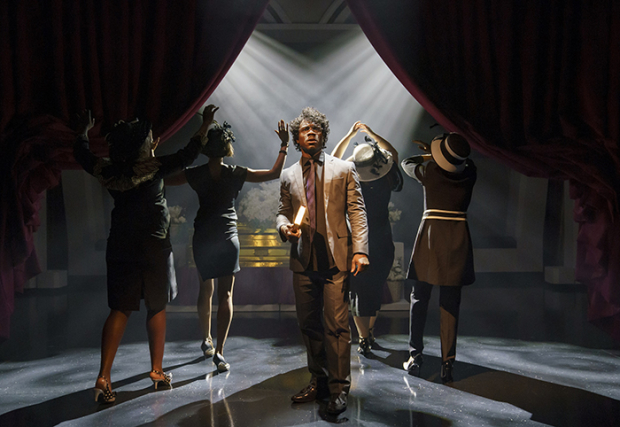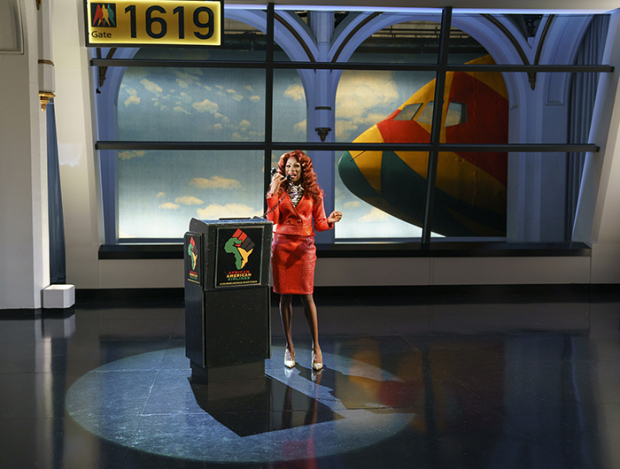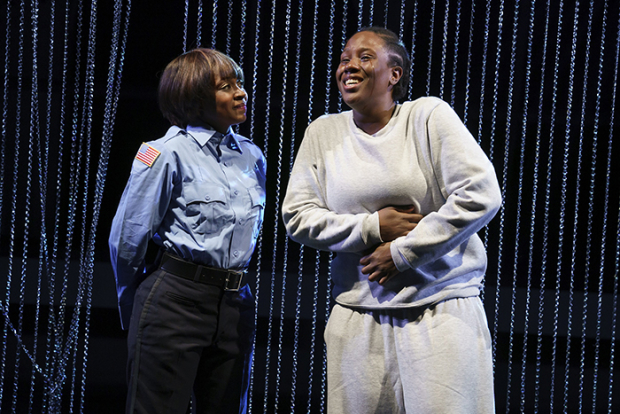Ain't No Mo' Says Bon Voyage to the Faulty Promises of Barack Obama's America

(© Joan Marcus)
Jordan E. Cooper's Ain't No Mo' opens on a raucous church celebration…I mean, funeral. It's all the same in Cooper's world, which allows the comic and tragic to peacefully coexist — one of the legacies of African-American culture you can tell he's most proud to celebrate in his hilarious and heartbreaking production, directed by Stevie Walker-Webb, at the Public Theater.
The funeral service is for "Brother Righttocomplain," the comrade who passed on to the hereafter the moment Barack Obama took the Oval Office and ushered in a post-racial America. Looking around our current post-Obama America, it's pretty clear that such an expectation couldn't have been more catastrophically misguided — which then raises the question: What more could we possibly do?
Cooper takes all of the anger and frustration behind that question and packs it like dynamite into one explosive thought experiment: a modern-day version of repatriation. (Brief history lesson: Repatriation was the short-lived movement of the early 19th century that supported the relocation of free blacks in America to Africa — more specifically, to Liberia, where around 13,000 Americans immigrated by the end of the Civil War.) Antislavery Americans believed it would offer free blacks a greater chance at self-governance, and pro-slavery Americans thought it would prevent the incitement of slave uprisings. It was a real win-win situation.
A contemporary version of that same mentality is at play in Cooper's near-future dystopian vision of a world where the United States government is offering all black Americans a free plane ticket "back" to a nonspecific "Africa." We then are presented with four vignettes (featuring different characters but the same brilliant actors) showing who exactly is deciding to take America up on its "generous" offer to flee, and more importantly, why. Maybe a complete exodus is the only way to prevent senseless police killings or quell the prison-industrial complex?

(© Joan Marcus)
To be clear, I don't think we're ever actually supposed to be on board with this plan — no matter how charismatic and convincing our fabulous flight attendant Peaches (played with levity and grace by Cooper) is. Everything in the production is heightened, from Montana Levi Blanco's stereotype-leaning costumes to Kimie Nishikawa's whimsical set design (including a cartoonish airport against which Peaches's bright pink wig can pop). However, by laying such an extreme premise within a slightly fantastical world, Cooper allows for one of the most nuanced and illuminating dissections of African-American identity I've seen on a stage.
And by "identity," I mean "identities" — an infinite number from which popular American culture soaks up every nutrient but then boils down to one simple but misleading label. Crystal Lucas-Perry, at one point, gets to embody the multitudes of "blackness" itself, interrupting a posh dinner party to confront its horrified guests with a breathless list of all the kinds of "black" she contains— the kinds they themselves have spent their lives suppressing in fear of being unmasked.
Another scene is set in an abortion clinic where black mothers hope to spare their unborn children the degradation of a future unjust death (Marchánt Davis and Fedna Jacquet deliver beautiful performances here). Another takes place in a prison where black inmates are released to board planes (Lucas-Perry standing out again as Blue, a prisoner of 15 years). Yet another is located on the set of a trashy reality show called Real Baby Mamas of the South Side, whose subjects perform artificial versions of "blackness" exclusively for the cameras. Interestingly enough, the battle between authentic and performative racial identity is being similarly explored just steps away in Suzan-Lori Parks's White Noise, but Ebony Marshall-Oliver and Simone Recasner (two of the Baby Mamas) take an even deeper plunge, getting into an all-out brawl about whether blackness is an inherited identity or a chosen one. Recasner's character takes a good amount of heat as she channels a Rachel Dolezal type, claiming her performance is her truth, no matter what genetics say. But does she get a plane ticket?
As Cooper so beautifully lays out, black identity in America is one big inscrutable web of dichotomies and contradictions that only gets more knotted the longer we fail to acknowledge how it came to be. But in all its many forms, Cooper seems to see it as both a gift and a burden — a bringer of joy and a source of fear — something both coveted and hidden away — an inherited legacy and a cultivated self — a shared experience and a unique history. Quite possibly the only thing that it isn't is portable.

(© Joan Marcus)










